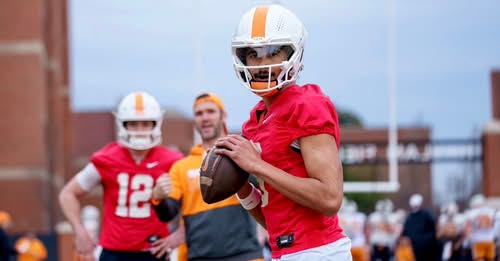Nico Iamaleava’s tenure as the starting quarterback for the Tennessee Volunteers has come to an unexpected end, marked by a high-profile dispute over his Name, Image, and Likeness (NIL) compensation. This development has sent ripples through the college football community, highlighting the evolving dynamics of athlete compensation and team relations.New York Post+5Reuters+5The US Sun+5WSJ
In 2022, Iamaleava, a five-star recruit from California, committed to Tennessee, reportedly securing an $8 million NIL deal with the university’s donor collective, Spyre Sports, before playing a single game. His freshman year in 2023 saw him serve as the backup quarterback, but he made a significant impact when he started in the Citrus Bowl, leading Tennessee to a 35–0 victory over Iowa and earning MVP honors. The following season, Iamaleava led the Volunteers to a 10–3 record and a College Football Playoff appearance, throwing for 2,616 yards and 19 touchdowns.WSJWikipedia+1Reuters+1
However, as the 2025 season approached, reports emerged that Iamaleava sought to renegotiate his NIL deal, aiming to increase his annual compensation from $2 million to $4 million. This request came amid a broader landscape where some players were securing even more lucrative deals. Tensions escalated when Iamaleava missed team meetings and practices, reportedly in protest of the university’s reluctance to meet his demands. Head coach Josh Heupel confirmed that Iamaleava’s departure was due to these contract disputes, emphasizing that no individual is above the program. New York Post+2Reuters+2The US Sun+2The US Sun+1WSJ+1
This incident marks a significant moment in college sports, as it is the first known contract holdout in the NIL era, drawing parallels to professional sports contract disputes. The situation has sparked discussions about the commercialization of college athletics and the potential challenges in team dynamics when high-profile players seek to maximize their earnings. It also underscores the growing influence of NIL deals in shaping athletes’ decisions and their relationships with university programs. WSJThe US Sun
As the spring transfer portal opens, Iamaleava’s next move is a topic of considerable speculation. While he has not publicly announced his intentions, reports suggest that he is exploring transfer options, with programs like UCLA potentially in the mix. However, the transfer landscape is complex, especially with conference-specific transfer rules and the timing of his potential move. CBSSports.com
For Tennessee, the departure of their starting quarterback necessitates a strategic pivot. The team will rely on redshirt freshman Jake Merklinger as the likely starter, with true freshman George MacIntyre as backup. Additionally, the Volunteers are expected to pursue quarterback talent through the transfer portal, though finding a ready-to-start player late in the offseason presents its own set of challenges. New York Post
This episode serves as a case study in the evolving landscape of college athletics, where NIL opportunities have transformed the traditional student-athlete model. It raises questions about the balance between fair compensation and team cohesion, and how programs navigate the complexities of modern recruiting and roster management. As the situation develops, stakeholders across the college sports spectrum will be watching closely, considering the implications for future athlete contracts, team dynamics, and the broader collegiate athletic framework.



